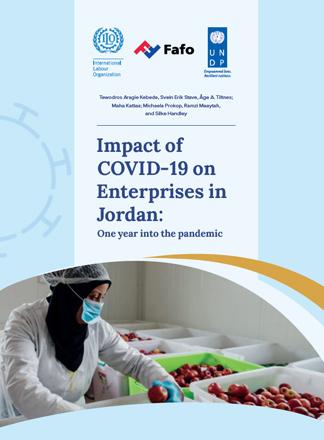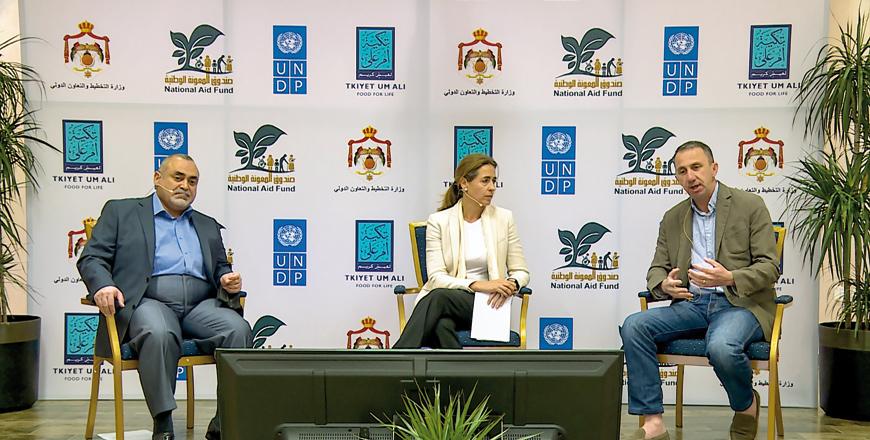You are here
Small businesses bear brunt of COVID-19 pandemic — report
By Batool Ghaith - Jul 13,2021 - Last updated at Jul 13,2021

AMMAN — Micro and small businesses, which make up the majority of private enterprises in Jordan, have been greatly affected by the pandemic, according to a new report by the International Labour Organisation (ILO), the United Nations Development Programme (UNDP) and Fafo Institute for Labour and Social Research (FAFO).
The report analyses two rounds of surveys of more than 2,000 enterprises across Jordan. The first survey was conducted in April 2020 and the second in February/March 2021, almost one year into the pandemic.
The report indicated that enterprises throughout Jordan continue to face significant challenges. Only a small number (10 per cent) of the enterprises surveyed benefitted from pandemic response measures. The report found that four out of 10 enterprises had to laid off one or more employees.
One in five enterprises confirmed that their debt grew. A quarter of enterprises surveyed had bank loans and more than a third had either supplier credit or informal credit from family or friends, the report stated.
According to the report, the greatest economic burdens on enterprises during the pandemic were rent (61 per cent), wages and social security payments (51 per cent) and payment of invoices (30 per cent).
The findings and recommendations were presented during a panel discussion in Amman on Tuesday, which brought together representatives of the government and social partners, UN partners and other experts.
The report emphasises the importance of “building forward better” through legislative measures to enhance enterprises’ sustainability and resilience post-COVID-19, while also assisting businesses during the pandemic.
However, the majority of enterprises said that they did not receive government assistance. The majority of those that did receive assistance were medium and large enterprises, rather than the micro and small enterprises. Almost four out of five micro enterprises were unaware of any assistance programmes, the report indicated.
Minister of Digital Economy and Entrepreneurship Ahmad Hanandeh indicated that the pandemic has helped people realise that digital transformation is the way to move forward.
“What we have experienced during the pandemic has made it clear that digital transformation is not an option; it is something that needs to be done. It is a way to support the economy and create jobs,” Hanandeh stated.
As per the report, many enterprises’ futures are questionable, with one out of every five claiming they will not be able to return to pre-pandemic levels of performance.
Pre-existing structural issues in the labour market, such as those encountered by informal daily wage workers, have been aggravated due to the pandemic. Informal daily wage workers make up a large percentage of the workforce in the construction, agriculture and tourism sectors.
ILO’s Country Coordinator for Jordan Frida Khan said that many businesses suffered difficult conditions even before the pandemic. “These difficulties were greatly amplified during the crisis. We must continue to collaborate closely with the government and other partners, including the private sector, to promote programmes and responses that address these structural obstacles, so that businesses and their employees can recover from the pandemic,” she stated.
According to the report, only 10 per cent of enterprises introduced e-commerce and online platforms.
Majida Al Assaf, UNDP deputy resident representative in Jordan, expressed concern over the fact that only few businesses have begun to invest in digital platforms or altered their business operations to expand into new markets. “This does not bode well for the long-term resilience of enterprises and competitiveness of Jordan,” she added.
The report stated that only four in 10 enterprises (41 per cent) trust their economic resilience and feel confident that they will come out of the pandemic as profitable and resilient businesses. Respondents from women-owned enterprises were slightly more confident, with more than half expressing confidence in their ability to cope with pandemic-related challenges.
The report noted that the ILO and the UNDP will collaborate to promote policy dialogue and develop a comprehensive programme to generate structural and inclusive reforms and assist their partners in all sectors to protect and support workers.
Related Articles
AMMAN — Around 85 per cent of Jordanian vulnerable households were heavily impacted by the COVID-19 pandemic last year, a local study reveal
AMMAN — The Jordan Chamber of Industry (JCI) and the International Labour Organisation (ILO) signed an agreement to enhance the productivity
AMMAN — The Arab Renaissance For Democracy And Development (ARDD) on Thursday held a virtual dialogue session that discussed the rapid impac

















